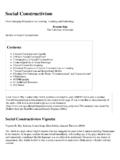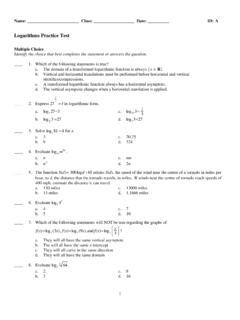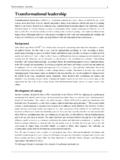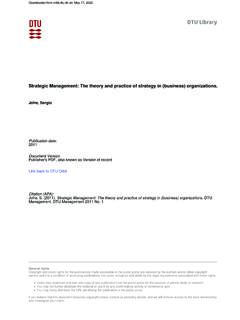Transcription of Transformative Learning: Theory to Practice
1 This chapter summarizes the transformation Theory of adult learning ,explains the relationship of Transformative learning to autonomous,responsible thinking (viewed as the central goal of adult education),and discusses practical implications for learning : Theory to PracticeJack MezirowA defining condition of being human is that we have to understand the mean-ing of our experience. For some, any uncritically assimilated explanation by anauthority figure will suffice. But in contemporary societies we must learn tomake our own interpretations rather than act on the purposes, beliefs, judg-ments, and feelings of others.
2 Facilitating such understanding is the cardinal goalof adult education. Transformative learning develops autonomous learning TheoryTransformative learning (Mezirow, 1991, 1995, 1996; Cranton, 1994, 1996)is the process of effecting change in a frame of have acquireda coherent body of experience associations, concepts, values, feelings, con-ditioned responses frames of reference that define their life world. Frames ofreference are the structures of assumptions through which we understand ourexperiences. They selectively shape and delimit expectations, perceptions, cog-nition, and feelings.
3 They set our line of action. Once set, we automaticallymove from one specific activity (mental or behavioral) to another. We have astrong tendency to reject ideas that fail to fit our preconceptions, labeling thoseideas as unworthy of consideration aberrations, nonsense, irrelevant, weird,or mistaken. When circumstances permit, Transformative learners move towarda frame of reference that is more inclusive, discriminating, self-reflective, andintegrative of frame of reference encompasses cognitive, conative, and emotional com-ponents, and is composed of two dimensions: habits of mindand a point of of mind are broad, abstract, orienting, habitual ways of thinking, feeling,NEWDIRECTIONS FORADULT ANDCONTINUINGEDUCATION, no.
4 74, Summer 1997 Jossey-Bass Publishers56 TRANSFORMATIVELEARNING INACTIONand acting influenced by assumptions that constitute a set of codes. These codesmay be cultural, social, educational, economic, political, or psychological. Habitsof mind become articulated in a specific point of view the constellation of belief,value judgment, attitude, and feeling that shapes a particular example of a habit of mind is ethnocentrism, the predisposition toregard others outside one s own group as inferior. A resulting point of view isthe complex of feelings, beliefs, judgments, and attitudes we have regardingspecific individuals or groups (for example, homosexuals, welfare recipients,people of color, or women).
5 Frames of reference are primarily the result of cultural assimilation andthe idiosyncratic influences of primary caregivers. Habits of mind are moredurable than points of view. Points of view are subject to continuing change aswe reflect on either the content or process by which we solve problems andidentify the need to modify assumptions. This happens whenever we try tounderstand actions that do not work the way we anticipated. We can try outanother person s point of view and appropriate it, but we cannot do this witha habit of mind. Points of view are more accessible to awareness and to feed-back from rgen Habermas (1981) has helped us to understand that problem solv-ing and learning may be instrumental learning to manipulate or control theenvironment or other people to enhance efficacy in improving performance;impressionistic learning to enhance one s impression on others, to present one-self; normative learning oriented to common values and a normative sense ofentitlement (members of the group are entitled to expect certain behavior).
6 Orcommunicative learning to understand the meaning of what is being com-municated. Communicative learning involves at least two persons striving toreach an understanding of the meaning of an interpretation or the justificationfor a belief. Ideally, communicative learning involves reaching a instrumental learning , the truth of an assertion may be establishedthrough empirical testing. But communicative learning involves understandingpurposes, values, beliefs,and feelingsand is less amenable to empirical tests. Incommunicative learning , it becomes essential for learners to become criticallyreflective of the assumptions underlying intentions, values, beliefs, and someone claims he loves you, how authentic is the expression of affec-tion?
7 Is the intent of a friendly stranger to sell you something, to proselytize,or make a sexual overture? Is an acquaintance being truthful? Is what is com-municated only a rationalization? Is it meant to be taken literally or as ametaphor? Is the message of a play what you interpret it to be? To resolve thesequestions of assumption, we rely on a tentative best judgment among thosewhom we believe to be informed, rational, and objective. We engage in dis-courseto validate what is being communicated. Our only other recourse is toturn to an authority or tradition to make a judgment for ,as used here, is a dialogue devoted to assessing reasons pre-sented in support of competing interpretations, by critically examining evi-dence, arguments, and alternative points of view.
8 The more interpretations of7 TRANSFORMATIVELEARNING: Theory TOPRACTICEa belief available, the greater the likelihood of finding a more dependable inter-pretation or synthesis. We learn together by analyzing the related experiencesof others to arrive at a common understanding that holds until new evidenceor arguments present transform our frames of reference through critical reflection on theassumptionsupon which our interpretations, beliefs, and habits of mind orpoints of view are based. We can become critically reflective of the assump-tions we or others make when we learn to solve problems instrumentally orwhen we are involved in communicative learning .
9 We may be critically reflec-tive of assumptions when reading a book, hearing a point of view, engaging intask-oriented problem solving (objective reframing), or self-reflectively assess-ing our own ideas and beliefs (subjective reframing). Self-reflection can leadto significant personal explored assumptions may be in the autobiographical contextof a belief, or they may be supporting a social, cultural, economic, political,educational, or psychological system. Transformations in frames of referencetake place through critical reflection and transformation of a habit of mind, orthey may result from an accretion of transformations in points of are four processes of learning .
10 Referring to the ethnocentric exam-ple, one process is to elaborate an existing point of view we can seek furtherevidence to support our initial bias regarding a group and expand the range orintensity of our point of second way we learn is to establish new points of view. We canencounter a new group and create new negative meaning schemes for them byfocusing on their perceived shortcomings, as dictated by our propensity third way we learn is to transform our point of view. We can have anexperience in another culture that results in our critically reflecting on our mis-conceptions of this particular group.






